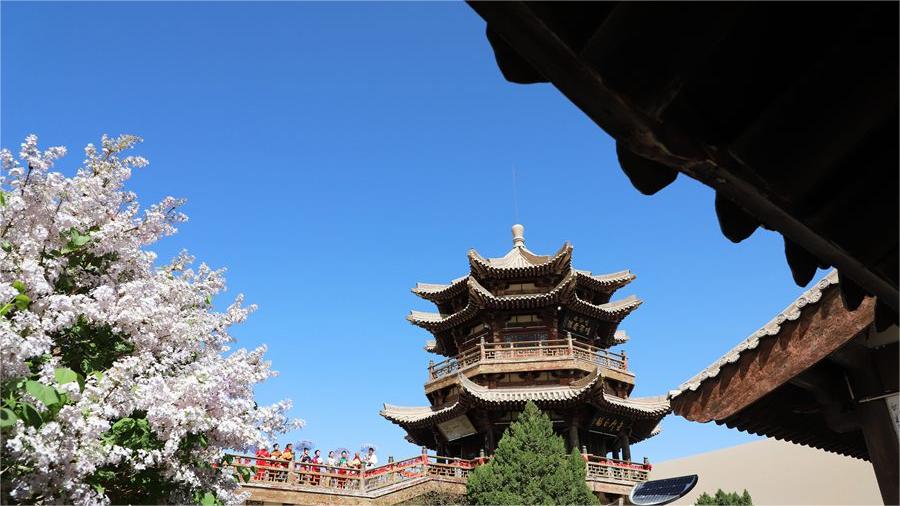Fingered citron fruit thrives in rocky terrain of SW China's Sichuan
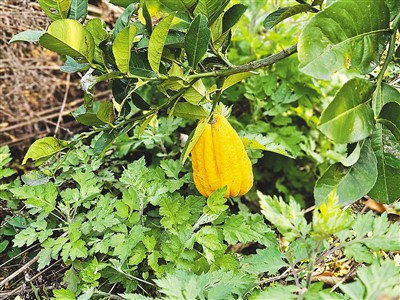
A golden fingered citron fruit hangs on a tree branch at a fingered citron plantation in Shawan district of Leshan city, southwest China's Sichuan province. (People's Daily Overseas Edition/Zhao Xiaoxia)
In Taiping township, Shawan district of Leshan city, southwest China's Sichuan Province, a villager named Li Yuxia tended to a fingered citron plantation where the air carried a delightful, refreshing fragrance. Looking up, the luxuriant branches of the citron trees thrived, growing lushly out of the rocky terrain.
Li cultivates Sichuan fingered citron fruit, distinguished by their closed, curled "fingers" rather than spread-out segments. Prized for its medicinal properties, it contains 0.12 percent of orange peel glycoside — four times the standard listed in China's largest medicinal guide, the Chinese Pharmacopoeia.
While fingered citron cultivation has a long history in Shawan, villagers previously planted it sporadically without much organization. However, the district has recently made significant strides in boosting the industry, employing methods like backfilling soil into rocky areas and cultivating improving tree varieties.
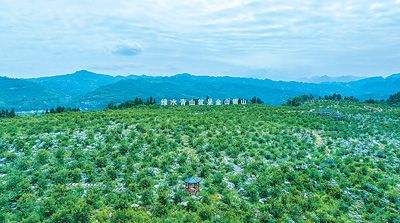
A fingered citron plantation at a modern agriculture park in Shawan district of Leshan city, southwest China's Sichuan province. (Photo/Zhang Jiwei)
Li Yuxia, 61, and her husband are employees of a fingered citron planting base, where they have worked for nearly a decade. The base covers an area of 18,000 mu (1,200 hectares) and generates an annual output value of 360 million yuan ($50 million).
During the day, they work at the base. After finishing work at 5 p.m., they devote their time to cultivating their own 8 mu of Sichuan fingered citron trees. Of the total, 5 mu belong to Li Yuxia's family, while they lease 3 mu from others. Four years ago, they used the land for growing corn, which yielded only a meager annual income of a few hundred yuan.
"When we saw the boss achieving higher economic benefits from growing Sichuan fingered citron trees, we decided to switch our land to the cultivation of the fruit and lease additional land," Li Yuxia said.
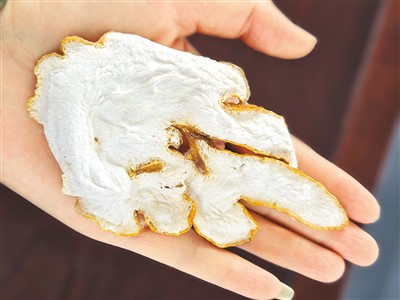
Photo shows fingered citron slices. (People's Daily Overseas Edition/Zhao Xiaoxia)
The "boss" Li Yuxia refers to Li Hongmei, the general manager of an ecotourism farm and founder of a medicinal herbs company. Li Hongmei and her husband started planting fingered citron trees 10 years ago.
While Li Hongmei now possesses extensive knowledge about fingered citron cultivation, her understanding was initially limited.
"I'm also a farmer," said Li Hongmei. "Before cultivating fingered citron, I had experience growing other medicinal herbs and learned the techniques from agricultural experts. When it came to Sichuan fingered citron, I followed the guidance of experts, learned their methods, and implemented them in the field. Through continuous trial and error, I gradually developed a set of cultivation practices and even encouraged nearby villagers to join."
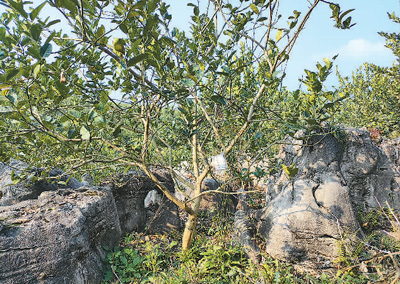
Fingered citron trees grow amid rock crevices. (People's Daily Overseas Edition/Xiong Jian)
Shawan district is situated in the southwestern part of the Sichuan Basin. It has a humid monsoon climate with distinct seasons and ample rainfall. The district is a significant contributor to the collection of medicinal herbs found in the treasure trove of Mount Emei in Sichuan.
However, Shawan is predominantly characterized by a karst landscape, covering over 70 percent of its area. As a result, the district has faced challenges in agricultural development due to infertile soil and limited surface water.
"The abundant rainfall and karst landscape are actually very favorable for cultivating Sichuan fingered citron," said Li Hongmei.
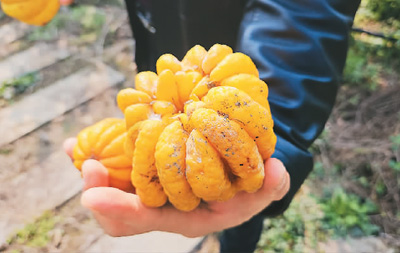
Photo shows Sichuan fingered citron fruits. (People's Daily Overseas Edition/Zhao Xiaoxia)
As owners of the fingered citron plantation base, Li Hongmei and her husband came to Taiping township in Shawan district in 2015. They leased 500 mu (33 hectares) of land and established a 100 mu experimental field for fingered citron cultivation.
"For fingered citron, the optimal location is amidst these rocks," explained Fang Qingmao, a researcher at the Sichuan Academy of Chinese Medicine Sciences. "Over many years, the accumulation of organic matter, particularly the high concentration of trace element selenium in the soil nestled between the rocks, creates an ideal environment for growth."
According to Fang, several crucial factors ensure the quality of fingered citron fruits, including warm, moist, fertile, and loose soil. The use of chemical fertilizers and growth hormones should be avoided, with a preference for organic fertilizers instead.
Due to its highly aromatic and long-lasting scent, fingered citron is frequently used as an ingredient in perfumes.
Fang explained that the high volatile oil content is a defining characteristic of Sichuan fingered citron. The tender leaves are suitable for making tea, while the mature leaves are used to extract volatile oils to produce fingered citron essential oils and related products.
Fingered citron serves both medicinal and culinary purposes, with significant demand in the pharmaceutical and food industries. Furthermore, it can be processed into various products such as preserved fruits, essential oils, face masks, floral waters and alcoholic beverages.
Shawan district has become the largest cultivation hub for Sichuan fingered citron fruits in China. The harvested fruits not only satisfy domestic market demand but have also found markets overseas. In 2023, local production of Sichuan fingered citron reached 28,000 tonnes, with a transaction value of 1.26 billion yuan.
Photos
Related Stories
- Springtime fruit vendors
- Taste magic fruit's intense sensation of sweetness in rural China
- Imported fruits enrich Chinese people's dining tables with affordable delights
- Electric rail vehicles boost dragon fruit shipping in Guangxi, south China
- Trending in China | Xinjiang: Bountiful harvest and fruitful delights
- Prickly fruit boosts rural economy in hilly province
- Mangshi city, SW China's Yunnan gives away 40 tonnes of fruits
Copyright © 2024 People's Daily Online. All Rights Reserved.








